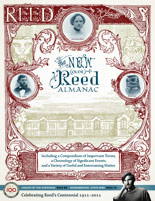
IRIS login | Reed College home Volume 90, No. 4: December 2011
The Invention of Herodotus
Many thanks to Ray Kierstead [history 1978– 2000], Peter Steinberger [political science 1977–], and Reed for returning focus on Herodotus and the histories he created. For, as Professor Kierstead reminds us, his account of the conflict between the Greeks and Persians is not a mere chronicling of facts, but the primal recognition that “time is the working out of such archetypical patterns” as reversals of fortune, pride, and punishment, and crime and retribution. As Henry Immerwahr so brilliantly illustrated, form and thought are originally unified by the father of history, the idea of which is perhaps as much akin to Platonic philosophy as to Sophoclean drama. The great Croesus story is indeed the seminal episode in the Histories and interlocks concentrically with the ultimate account of the Persian Wars. So, it generates the awful realization that any linear interpretation of history is, at the very least, simplistic. And it sustains my belief that Herodotus and his intellectual descendants currently less regarded—Hegel, Freud, Camus—are the better guardians of history.
Marc Madden ’71
Corte Madera, California

Editor's Note
Features
- The New (Olde) Reed Almanac
- Such Sweet Thunder
- Guerrilla Archivist
- Avoiding Your Parents’ Basement
- The Small Chill
- Darkness, Light, and Drama in the Oresteia
- Steve Jobs: Prodigal Son
- Helen Stafford: Green Pioneer
- Stage Struck
- Smog Buster Leaves $2.5 Million to Reed
- Peter Russell: The Gene Genie
- Ed Segel: History’s Ambassador
Reediana
- Roger Porter: Bureau of Missing Persons
- Robert Levin ’79: Work Meets Life
- Kate Christensen ’86: The Astral
- Kraig Kraft ’00: Chasing Chiles
- Reediana Briefs
Eliot Circular
- 100 Years of Greatness
- Joining the Tribe
- The Art Spark
- Searching for a Leader
- Navy Secretary Wins Eliot Award
- New Faces: Trustees
- New Faces: Professors
Empire of the Griffin
Alumni Profiles
In honor of Reed’s 100th birthday, make your gift this year and pledge your continued support in the future.

REED MAGAZINE STAFF
EDITOR
503/777-7596
CLASS NOTES EDITOR
503/777-7591
WEB DESIGNER
503/459-4632
LATEST COMMENTS
steve-jobs-1976 I knew Steve Jobs when he was on the second floor of Quincy. (Fall...
Utnapishtim - 2 weeks ago
Prof. Mason Drukman [political science 1964–70] This is gold, pure gold. God bless, Prof. Drukman.
puredog - 1 month ago
virginia-davis-1965 Such a good friend & compatriot in the day of Satyricon...
czarchasm - 4 months ago
John Peara Baba 1990 John died of a broken heart from losing his mom and then his...
kodachrome - 7 months ago
Carol Sawyer 1962 Who wrote this obit? I'm writing something about Carol Sawyer...
MsLaurie Pepper - 8 months ago
William W. Wissman MAT 1969 ...and THREE sisters. Sabra, the oldest, Mary, the middle, and...
riclf - 10 months ago